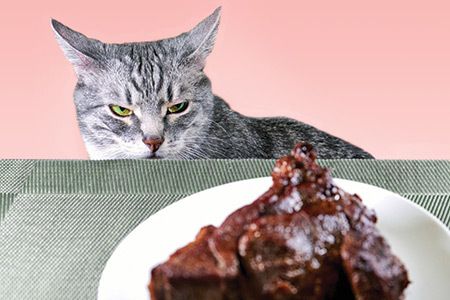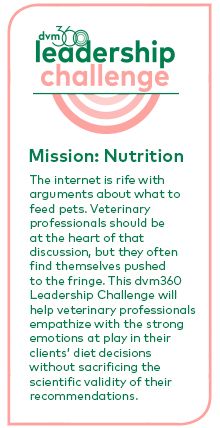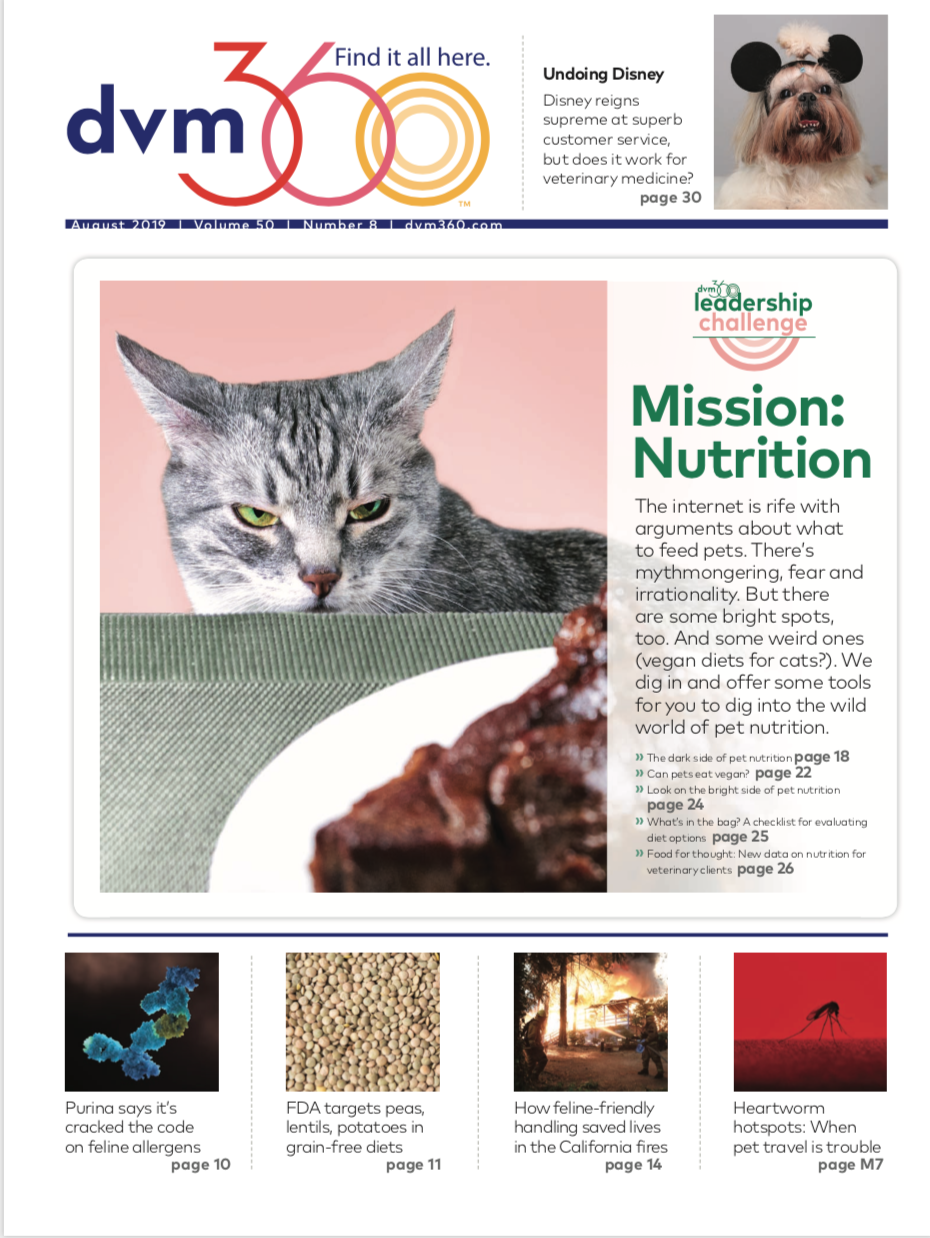The dark side of pet nutrition: Mythmongering, irrationalityand passionate devotion
When your veterinary clients hold fast to their deepest beliefs about whats best (and worst) for their pet to eat, you make think theyre crazybut its also because they care.
Andrey Zhuravlev/stock.adobe.com

Sometimes pet owners can take an idea on pet nutrition and run with it-far into left field and then out into the extreme fringes. From raw food diets to gluten-free kibble, we asked the experts about the top myths when it comes to pet nutrition and how veterinarians can help set the record straight.
The making of the myths
Many pet food myths that are circulating aren't necessarily myths but concerns rooted in past events-such as recalls-or human nutrition fads. Donna M. Raditic, DVM, DACVN, CVA, of Nutrition and Integrative Medicine Consultants in Athens, Georgia, says she fields a lot of questions about specific ingredients, what “byproduct” means on food labels, concerns about certain toxins or preservatives, and how much pet food is processed. These questions originate in mainstream media, social media, advice from friends and even generational differences, Dr. Raditic says.
“Some of it is just how millennials think,” Dr. Raditic says. “They are very interested in and proactive about health and exercise. They see a disparity between nutritional recommendations for us to eat fresh, wholesome, organic, GMO-free, unprocessed foods and what they're feeding their pets.”
Millennials are fast becoming the majority of veterinary clients, Dr. Raditic says, and they're typically well-educated, have higher incomes and are more aware of health issues for both themselves and their pets than the average consumer.
“A survey done awhile ago showed that pet parents think ‘wellness care' means nutrition, exercise and supplements,

whereas veterinarians think it means vaccines and flea, tick and heartworm prevention,” Dr. Raditic says (see the survey report here). “There's a real disparity here that we need to address to meet our clients' expectations for veterinary care.”
Pet owners look for alternative or unconventional pet foods because conventional diets don't really look like real food, and these pet owners view their pets as family members, Dr. Raditic says.
“So why wouldn't they want their family members to eat better diets, just like they would want for their human child?” she says.
My pet can't eat that!
Sarah J. Wooten, DVM, CVJ, a small animal practitioner in Colorado and Fetch dvm360 speaker on leadership and client communication topics, says a common assumption she hears from pet owners is that organic pet food is better than conventional.
“The fact is that there's a very limited quantity of organic meat and produce available. Good-quality organic ingredients are very hard to come by for pet food producers because there's such a high demand for organic products in the human market,” she says. “What's left over for the pet food market is often low-quality, whereas conventional ingredients, while not organic, are better-quality. … It's sad when consumers think they're buying a better-quality product for their pet just because it says ‘organic' on it.”
Another myth is the idea that gluten-free products are better for pets. “Besides one line of Irish setters, most pets don't really benefit from gluten-free food,” Dr. Wooten says.
Dr. Wooten says she also hears a lot of questions about corn and wheat allergies, which she says are not an issue for most pets.
“The most common food allergies in pets are protein allergies-beef, chicken, pork, soy. Wheat and corn allergies are much less common,” Dr. Wooten says. “Sometimes corn and wheat can be moldy, which can be a problem because aflatoxins are toxic; however, the grains themselves are usually fine for pets.”
Fact or fiction?
While some might call these beliefs about pet nutrition “myths,” Dr. Raditic says they technically can't be myths when there isn't a deep enough understanding of the truths of pet nutrition.
“Right now we don't have enough long-term, well-designed studies on pet diets,” she says. “We don't have tons of clinical studies that use evidence-based medicine to tell us that our current, conventional, traditional pet foods are the best nutrition for pets, just as we don't have data to support that feeding them nontraditional diets is the best nutrition.”
There are some studies on pet food ingredients, Dr. Raditic says, mostly because pet food companies have wanted to understand how to use those ingredients in pet foods. There are also some studies on purified diets to determine which exact nutrients-and at what levels-dogs and cats need.
“We do not have a large amount of information about our traditional pet foods and how they impact the long-term health of dogs and cats,” Dr. Raditic says. “This is what we need to move pet nutrition forward to improve the lives of cats and dogs.”
There has been more research in nutrition for production animals, because these studies translate to the human food supply. Outcomes are not as easily measured when it comes to small animal nutrition, Dr. Raditic says, and the economics aren't there to support investment in large-scale research for pets.
“Instead, there is a huge amount of money put into marketing pet foods, and this marketing confuses pet parents and veterinarians,” Dr. Raditic says.
Pet owners do have reason to be concerned about ingredients, Dr. Raditic says, recalling issues with melamine and toxins such as mycotoxins and pentobarbital finding their way into pet food.
“I try to give clients perspective because these issues happen in our foods, as well,” she says. “But still, their concerns have been validated to some extent.”
It can be difficult for both pet owners and veterinarians to sort through the massive marketing noise to find out the truth about pet foods, Dr. Raditic says, and this has resulted in some pushback from consumers seeking more transparency.
“In my opinion, this is a good thing,” Dr. Raditic says. “If we don't keep demanding more science, more research on pet nutrition, pet foods are not going to improve. And although outcomes such as quality of life and longevity for pets might seem lofty, it is what we-pet parents, veterinarians and the pet food industry-need to continually strive for to improve pet nutrition.”
Misleading marketing and well-meaning pet parents
While some myths are rooted in human nutrition, Dr. Wooten says, there's also the classic "I read it on the internet" origin story for many nutrition fallacies. Pet owners can be impressionable and want an expert's confirmation that they're providing the best care possible for their pets. And unfortunately, the internet is rife with “experts.”
“If pet owners see advertising that leads them to believe a nutrition myth, or information on the internet from a website that purports to be a leading authority in pet nutrition, then they're likely to believe what they read,” Dr. Wooten says. “Millennial pet owners are an easy target because they often have less experience with caring for a pet, and a wide open heart that cares deeply and will do anything for that pet.”
Many of these invested pet owners feel a heavy burden of responsibility to select the best diet, and walking down the aisle with so many choices can be daunting.
“There's so much social media, advertising, pet food expertise, marketing and more marketing,” Dr. Raditic says. “It can be very frustrating and difficult for pet parents and even veterinarians to sort through all this information.”
Owners of pets with chronic disease are also a population where nutrition myths run rampant. These people are already searching for answers to their pet's problems, they may want to avoid long-term medication for their pet and they would like food to be medicine, Dr. Wooten says.
“People are searching for answers to help their pets live long and live well. If they see something that promises either of these things, they're likely to try it because they think the food can meet a felt need,” Dr. Wooten says. “Pet owners also make emotional decisions long before they make a logical decision with their higher brain-it's just how we are wired.”
Clearing the confusion
Veterinary commentator and advocate Jessica Vogelsang, DVM, CVJ, of the blog Pawcurious, says pet owners' food quirks really aren't as much about food as they are about psychology.
“It's not just about the food. Honestly, it never has been. For a lot of people, food has a moral component, thus all the emphasis on ‘good eating' versus ‘bad eating,' or on ‘clean food,'” Dr. Vogelsang says. “Those who eat the ‘right' way are possessed, in their minds, of a more virtuous constitution. What we see in the pet food industry is just an extension of what happens already on the human side.”
Everyone has that friend who boasts the virtues of their diet, be it keto, vegan, paleo or Whole30, she adds. Whether or not their devotion is grounded in nutritional truth, they are nonetheless devoted.
“Those who eat the ‘right' way are possessed, in their minds, of a more virtuous constitution. What we see in the pet food industry is just an extension of what happens already on the human side.”-Dr. Jessica Vogelsang
“If someone truly embraces a belief about a certain type of food-be it raw or grain-free or organic-you can no more shake them out of their faith with factual arguments than you could argue someone out of a religious belief with science,” Dr. Vogelsang says. “The faith wasn't born out of science to begin with, but out of a belief system.”
It's a slippery slope, however, from good intentions to bad mistakes, Dr. Vogelsang says.
“Where you have good, you also must have evil. So instead of simply ignoring a company that makes a type of nutrition you don't choose to purchase, you have people talking about ‘Big Kibble' and the ‘4 Ds' [a belief that pet food diets contain meat from dead, dying, diseased and disabled animals], shady people in dark suits trying to swindle you, and vets who clearly know less than you based on your exhaustive internet education,” she says. “The narrative suits their belief system, so it's very easy to accept. Remember when fat was bad and we all ate margarine for a decade? And then sugar became bad and everyone started choking down Sweet'N Low? These extreme beliefs always exist in a universe of equally extreme consequences.”
The challenge is in trying to correct these hard-held beliefs or misinformation, especially when a pet owner is emotionally invested.
“Once a decision has been made to believe something, everything in a person will move to defend that decision, even if facts tell a different story,” Dr. Wooten says. “If a client is rigid and not open to accurate or beneficial information about their pets, then that pet won't receive the proper nutrition or treatment because the held belief is in the way.”
Sometimes the key is in finding what inspired a certain belief in the first place.
“You can acknowledge that it's OK to hold that belief,” Dr. Wooten says. “Ask the client why they believe what they do-nicely, not defensively. Above all, don't be defensive,” Dr. Wooten suggests. “Ask them in a way that says, ‘Help me understand what you're thinking so I can best advise you.'”
Respect these clients' beliefs, even if you disagree, and understand that the pet owner thinks they're right, Dr. Wooten says. After they share their opinion, acknowledge it, then ask if you may also share your knowledge on the matter, she adds.
“It's their pet, and they have every right to care for their pet in the way that seems best to them,” Dr. Wooten says. “You are just there as a trusted advisor.”
Sometimes the client will hold fast to their belief, and the veterinarian has to be OK with that, Dr. Vogelsang says.
“I don't argue with people who've gone down that road, because there's no point. I do think it's important to acknowledge that obviously they care very deeply and want to do what's best for their pets, and then empathize that I do as well, even though the path isn't the same for me,” she says. “No one likes it when you imply they're ignorant or uneducated; it's just not an effective tool to convert people's thinking. Some come back around, as they are starting to do with the current concerns over dilated cardiomyopathy and certain foods, and others dig in their heels even more. You have to accept that in some people's minds, we aren't the experts-then cut them loose.”
“The psychology is easy to understand,” Dr. Raditic agrees. “Pet parents are passionate about their pets. And those pet parents with the most fear and distrust-who are so adamant about what is right or what is wrong with pet food-are actually your best, most passionate pet parents.”
Can myths motivate change?
When does a veterinarian stop trying to correct pet owners, and when do they push for better data?
“In my opinion, the only time pet parents' beliefs harm pets is when they jump to extremes. They get blinded or overwhelmed with these issues and become afraid, distrustful and are no longer logical. Fear is not the emotion you want pet parents to have, as it results in poor decision-making,” Dr. Raditic says. “We work very hard to try to reassure pet parents who are overwhelmed with fear and guide them to make better decisions. But it certainly doesn't help that the pet food industry has had some real issues with recalls, contaminations and ingredient substitutions. You cannot blame pet parents that they're becoming more and more skeptical and less trusting of the pet food industry.”
Sometimes, admitting and acknowledging what you don't know and providing information about what you do know is the best approach when informing pet owners about nutrition, Dr. Raditic says.
“We need to empathize that selecting pet diets is not easy, but we will work with them to try and sort it out to find a pet diet that works for their pet and its lifestyle,” she says.
More than anything, Dr. Raditic says, veterinarians need more information about pet nutrition and ideal diets.
“We all need to become more educated, ask the right questions and make demands for more transparency and truthful information about pet diets. Pet labels and websites give some information, but it's not enough to determine ingredient quality and thus the overall quality of the pet food,” Dr. Raditic says. “And yes, we do need more unbiased studies of dog and cat nutrition and long-term studies looking at different types of diets to improve and develop pet foods that we know can improve quality of life and longevity.”
Rachael Zimlich, RN, BSN, is a former reporter for dvm360. In addition to freelance writing, she works as a registered nurse at the Cleveland Clinic in Cleveland, Ohio.
